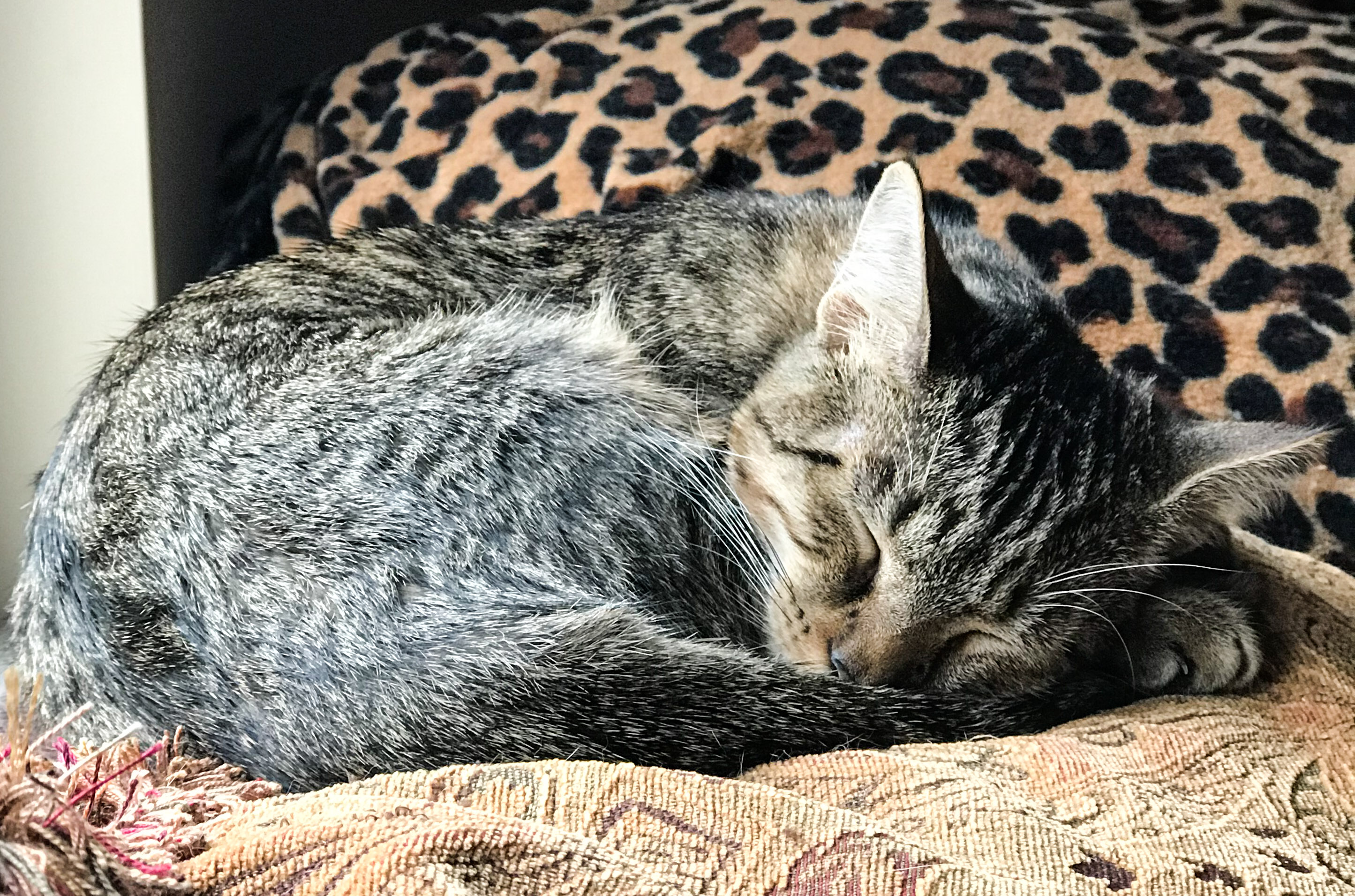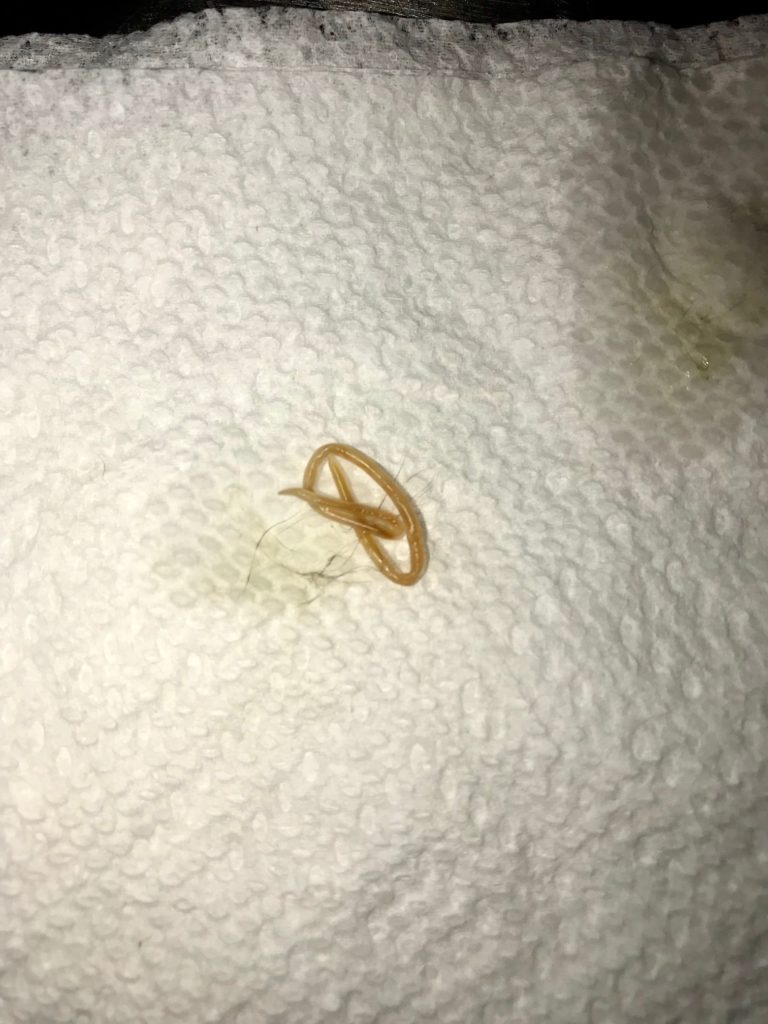
You would not know by just looking at this picture, but Ranger was very sick when I took this picture. Ranger was suffering from a severe case of lungworms. A parasite which we had treated with several rounds of the appropriate dewormer. These lungworms were wreaking havoc on Ranger’s body, and they opened the door of fear that Ranger had an underlying terminal disease.
Lungworms
Lungworms are a parasitic worm species that cause severe respiratory problems. Cats that are allowed to roam outdoors are at a higher risk for developing this type of parasitic infection. (FYI: Ranger is strictly an indoor cat.) There are several species of worms that can migrate to the lungs of animals. The symptoms common to lungworms are coughing and shortness of breath. The coughing is caused by the worm larvae that are laid in the airway, which eventually causes difficulty breathing and mucus accumulation. If left untreated, complications in the damaged airways can lead to more serious problems such as emphysema, fluid build-up in the lungs, pneumonia, and much more which I will discuss in Ranger’s case.
Last fall, I started to notice Ranger was developing a very strange cough. It had a phlegm-like sound and Ranger would keep swallowing after each cough. This cough would go on for at least a minute. Below is the first video I was able to capture and provide to his doctor.
His doctor immediately knew Ranger had lungworms. Ranger went in for a full exam with lab work, and she started him on treatment immediately. She would also put Ranger on a follow-up treatment to ensure the cycle of the eggs and larvae of the worms would be removed as well. I figured Ranger would be just fine since every other parasite we had dealt with was an easy treatment. However, that would not be the case.
The Downward Spiral
Unfortunately, Ranger’s lab work came back with a very worrisome and grim outlook. His platelets and neutrophils were very low. (On a side note, when your cat’s doctor calls you on a Friday afternoon to discuss the unfortunate lab results, you kind of know this is not good.) Ranger’s doctor discussed the array of factors that would cause such lab results. Some were fine and some were not very good at all. She explained the game plan she had, and I agreed. Admittedly, I was stunned by Ranger’s blood work. I live by the saying, be prepared to be unprepared, and this news hit very fast and I was unprepared. Just months ago, I had to let Cooper go from pancreatic cancer and an array of health issues. Now a 6-month-old Ranger!
By the way, you know what you find online when you search causes of low neutrophils and platelets? You find FeLV (Feline Leukemia), FIP (Feline Infectious Peritonitis), nothing good! You don’t find Google listing lungworms as a cause. By the way, I do not recommend going online to “research” when you have received some scary news. Leave the research to your trusted professional.
Even though Ranger’s blood work was a bad sign, we were going to help Ranger in whatever way we could. Ranger was dealing with lungworms and possibly a more life-threatening disease. On a positive note, while Ranger was beginning treatment for lungworms, he ended up coughing up a lungworm. It was gross, but I could only imagine that Ranger would have felt much better after getting this large worm out of his lungs. The medication was doing its job!
The day before Ranger coughed up the large lungworm, he had a long coughing spell that I was able to capture on video. You will see Marmalade appear to check on Ranger at the end. Marmalade was well aware of Ranger’s health decline. After the video is a picture of the actual lungworm Ranger coughed up less than 24 hours later. Sorry, it is not the most appetizing pictures, but it certainly gives a clearer picture of what these parasites can become.

Unfortunately, Ranger was not getting better even after coughing up one of the lungworms. He quickly started to decline on energy, and I was starting to see what the lab results had already shown. Ranger was sleeping more, he was vomiting more, he just did not feel well. Ranger was in and out of the vet for lab work as well as a retest for FeLV. Ranger had already been tested twice when he was a kitten for FeLV & FIV. Both times, he tested negative. However, in some cases, Feline Leukemia can hide within the bone marrow, and by the looks of things, Ranger was showing signs of having FeLV or dry FIP. Both of which are terminal with no cure. Ranger’s FeLV test came back negative, but that did not really say much because to get an accurate result, Ranger would have to have a bone marrow aspiration procedure. In the meantime, Ranger’s doctor was giving him every treatment he could safely receive as well as still treating the lungworms.
As bad as Ranger felt during this ordeal, it was his sister, Marmalade, that kept his spirits up. She kept him moving and playing, but she also gave him tons of snuggles so he would rest. We were all surprised that Ranger was as playful as he was acting considering how we knew his body was feeling. I have to give Marmalade all the credit for keeping Ranger’s spirit up. She was and still is his rock!

Another Unexpected Turn
The time came for a final run of lab work before we scheduled Ranger for a bone marrow aspiration procedure to determine if in fact, Ranger was suffering from Feline Leukemia. If that was negative, Ranger would most likely have been diagnosed with dry FIP. FIP is diagnosed by basically eliminating other causes of the symptoms. It is a serious diagnosis that any good vet would not diagnose unless they knew they have eliminated any other cause. So, Ranger had his blood drawn, and I took him home to wait for the results which normally took 24 to 28 hours. Honestly, I was prepared to get the same report of declining blood counts. But, 36 hours later, I received an early morning text from Ranger’s doctor. Ranger’s lab work had actually improved! ????❤️ So, what did this mean? Well, it most definitely eliminated the possibility that Ranger had FeLV or FIP! Ranger’s bloodwork would not have improved on their own had Ranger been suffering from such diseases, and there was no need for a bone marrow aspiration! Ranger was not going to leave us so fast after all!!!
What was the cause of Ranger’s health declining? It was Parasites! Those disgusting Lungworms! What many of us may not realize is how much of a severe toll parasites can take on our pets health. Ranger’s health had declined to the point where his blood counts were the equivalent to a cat suffering from a terminal disease.
Ranger was not out of the woods, but his doctor had a path made for him to get out. Ranger would still need to get regular lab work, he would need additional deworming treatments since the lungworms had developed to severe case. However, with persistence and patience, Ranger would slowly but surely recover from the lungworms!
Next week, I will finish up Ranger’s Parasite Story with how Ranger’s health is present day. Did the lungworms leave a mark on his overall health?
Thank you to Ranger’s doctor, technicians, and staff at Riverview Animal Clinic.
Note: The videos, pictures, and the text are not meant to replace the veterinarian profession. I am not experienced or licensed in the veterinarian field. I am only sharing a specific experience with Ranger that involved many health factors and conditions that were handled by a licensed veterinarian. Please take your pets to a reputable licensed veterinarian to obtain proper examinations to diagnose your pet’s conditions.





Praying for little Ranger !! He has the best of care and the best momma ever !!!
Thank you!! ❤️